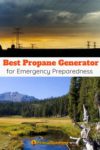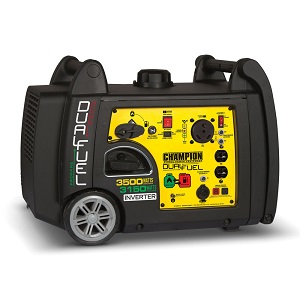Propane generators are clean, low-maintenance, and run smoothly, even in the coldest winters. As a fuel, propane is more straightforward to store than gas or diesel making it a reliable option for preppers who don’t have a gas supply to their property.
In our Buyer’s Guide, we cover the pros and cons of a propane generator compared to a gas or diesel-powered generator. But if you just want to know which one to buy, read on for our top picks.
 Champion 9375/7500-Watt Dual Fuel Portable Generator
Champion 9375/7500-Watt Dual Fuel Portable Generator
A powerful, user-friendly generator that’s easy to set up and reliable to run.
 WEN DF475X 4750-Watt Portable Generator
WEN DF475X 4750-Watt Portable Generator
An affordable generator that’ll keep smaller households powered up.
Best Propane Generator Reviews
Best Overall: Champion 7500 Watt Dual Fuel Portable Generator
Continuous power: 7500W/6750W
Weight: 202 lbs
The Champion is a powerful, reliable dual-fuel generator that provides sufficient power to keep your lights, refrigerators, freezer, and electronics running when the mains power is down.
You can also use it to power more energy-intensive appliances such as water heaters. There’s an electronic start switch, and you can connect the generator to a transfer switch in your house.
You can run the generator off the 6-gallon gasoline tank or connect it to a propane tank (connection hose included).
One thing we love about this generator is how user-friendly it is. The instructions are clear and simple, and it’s easy to set up even if you don’t have prior experience with generators. The “Intelligauge” enables you to track voltage, hertz and run-time hours (so you know when maintenance is required).
Like most generators, it’s heavy, but the wheels are better quality than other models, and it’s pretty easy to maneuver despite the weight. It’s not the cheapest model on the market, but we think the quality, reliability, and ease of use are worth the extra money.
Pros
- Excellent performance
- Easy to track power output and maintenance intervals
- Straightforward setup
- Relatively easy to maneuver
Cons
- Shorter run time than other models
- Expensive
Runner Up: Westinghouse WGen 7500DF
Continuous power: 7500W/6750W
Weight: 192 lbs
The Westinghouse WGen dual-fuel generator boasts a continuous power rating of 7500 watts when run on gasoline and 6750 watts when run on propane. This makes it powerful enough to keep your household essentials running, including power-hungry water heaters or air conditioning systems.
Check Prices on Amazon
The generator can be connected to a transfer switch, so you don’t need to run extension cords from individual appliances to the generator. It starts up at the touch of a button (there’s also a pull cord as backup), or you can use the remote key fob to turn it on or off from inside your house.
The 420cc OHV air-cooled Westinghouse engine will run for up to 16 hours at 25 percent load or 11 hours at 50 percent load. The built-in fuel gauge helps you know when it’s running low on fuel, and it’s possible to switch fuel sources while keeping the generator running.
It’s pretty heavy, but the wheels and handle make it movable with a bit of muscle power. Although Westinghouse offers a 3-year guarantee and national customer support, reviews of their customer services are mixed.
Pros
- Electric start button
- Remote start option
- Excellent value
- 3-year service, labor and parts coverage
Cons
- Heavy
- Mixed experiences of customer service
Best for Heavy Power Users: DuroMax Hybrid Dual Fuel 12,000-Watt
Continuous power: 9500W/9025W
Weight: 224 lbs
The DuroMax Hybrid Dual Fuel is a workhorse of a generator that can comfortably power your whole house. Nicknamed “The Beast,” it delivers over 9000W of continuous power and has a 50-amp outlet for heavy-duty use in addition to 20 and 30-amp outlets. You have the option to operate at either 120V or 240V or both simultaneously.
Check Prices on Amazon
The run time of 8 hours on gasoline or 7 hours on propane is less than other models, but given you’re drawing more power, this may balance out. Note that DuroMax recommends using a 40 lb propane tank rather than the standard 20 lb tank.
As you might expect, this generator is heavy, and if you leave it stationary for a few days, the tires begin to flatten.
Experienced generator users won’t have a problem setting it up, but new users may struggle with the sparse instruction manual. It’s also worth bearing in mind that the 3-year warranty covers parts but not labor or shipping.
Despite these downsides, the DuroMax Hybrid Dual Fuel represents excellent value for money if you’re wanting to power heaters, air conditioning units or use power tools.
Pros
- Powerful dual-fuel generator
- 20, 30 and 50-amp outlets
- Relatively low cost (for its size)
Cons
- Tires flatten over time
- Instruction manual could be more detailed
- Warranty only covers parts
Best Inverter Generator: Champion 3500W Portable Inverter Generator
Continuous power: 3200W
Weight: 95 lbs
This inverter generator is an excellent option for smaller households or a second generator for powering sensitive electronics such as laptops and tablets.
As a guide, you should be able to use it to run a refrigerator, freezer, television, and a couple of laptops. If you want more power, you can connect two of the Champion inverter generators using a parallel kit, but this works out very expensive compared to a generator such as the Westinghouse.
Check Prices on Camping World
The Champion’s engine automatically throttles up and down depending on the load, making it more efficient than a conventional gas generator. It’s also a lot quieter, producing just 58 dBA of noise. This makes it a great option for RVs or urban areas where you don’t want the neighbors complaining.
The generator is easy to set up and has an electric start switch. Unfortunately, it doesn’t come with an hour meter (to help you know when to change the oil), but it’s easy and cheap to add one of these.
Pros
- Stable current for sensitive electronics
- Energy efficient with a long-running time
- Relatively lightweight
- Quiet
- Can link units together
Cons
- Expensive
- Not as powerful as conventional generators
Best Budget Propane Generator: WEN DF475X Dual Fuel Generator
Continuous power: 3800W/3500W
Weight: 106 lbs
The WEN DF475X has a reasonable spec for a budget unit.
You can switch between 120V and 240V, allowing you to power a water heater or heavy-duty power tools. There’s also a DC outlet for charging batteries. The generator has an electric start with a key – a nice security feature unless you’re prone to losing keys…
At 106 lbs, it’s lighter and more portable than most large generators. If you’re looking for a smaller generator and are on a budget, the WEN DF475T offers great value for money.
Pros
- Great value for money
- Relatively lightweight
- Electric start
- CO Shutdown sensor
Cons
- Some users have reported issues with shipping
Pros and Cons of Propane Generators
Before diving into our Buyer’s Guide, we wanted to cover the pros and cons of propane generators compared to diesel or gas-only generators. See best gas generators.
Propane generators are typically dual fuel, meaning you can also run them on gasoline. However, they’re significantly more expensive than a gas-only generator.
So why is it worth investing in a propane generator?
Advantages of Propane Generators
- Propane generators start easily in all climates, including cold temperatures
- Propane burns cleaner than gas or diesel, producing half as much carbon monoxide as gasoline
- You can store propane in a tank on your property, so you don’t have to worry about filling up at a gas station – Read how much propane does a generator use
- Unlike diesel or gasoline, propane doesn’t degrade over time making it easier to store
- Propane generators require less maintenance and are a better option if your generator only gets infrequent use
- Propane generators are quieter than gas or diesel – Read how to keep a generator quiet
Disadvantages of Propane Generators
- Propane generators are less efficient than gas or diesel, so you’ll burn more to get the same power output
- Propane is less readily available if you run out
- Propane engines have a shorter life expectancy than diesel or gas generators
- It typically costs more to run a propane generator
Read more about propane versus gas generators.
Conventional vs Inverter Generators
Most large generators you come across are the conventional kind with a large steel frame, fuel tank, and wheels for maneuverability. They are cheaper and more powerful than inverter generators and likely to be the best option if you want an emergency power source for your home.
However, inverter generators do have some advantages. Although they’re less powerful, they are more efficient, giving a longer run time. They’re also much quieter than conventional generators and produce fewer emissions.
The main benefit of an inverter generator is that it produces “clean electricity.” Whereas a conventional generator produces AC electricity, an inverter produces AC converted to a DC, then back to an AC. This means that the current produced is much more stable, making it a better option for charging sensitive electronic devices.
Power Output
Generator power output is measured in watts. When shopping for a propane generator, you want to look at the continuous power output rating and the peak power output.
The continuous output provides power for the normal working load. The peak output enables appliances to draw on the additional capacity for a short period of time when starting up.
But how do you calculate how much power you need?
First, you need to know how much power your appliances and electronic devices need to run. Add these up to get an estimate for your total power requirement. This will help you decide which generators meet your requirements. Don’t forget to take into account the additional power appliances need when starting up.
To give you a rough idea, a 5,000-watt generator should enable you to run a refrigerator, sump pump, TV, microwave, and some lights. Heaters and air conditioning units typically draw a lot of power, so it’s worth thinking of alternative ways of heating and cooling your home in an emergency.
For a more accurate calculation, have a look at our generator size calculator.
Connecting a Generator to Your Home
If you want to use a large generator (5000 watts or more) to power hardwired appliances, such as a water heater or well pump, you’ll need to install a transfer switch. This looks a bit like your circuit breaker panel and allows you to select which circuits you want to power from your generator. Rather than connecting lots of appliances (or extension leads) directly to the generator, you have just one cable running between the generator and the transfer switch.
Installing a transfer switch isn’t cheap. An interlock device is a more affordable option, specific to your generator model, but you’ll still need to get an electrician to fit it.
Related Reading
Check out these articles for more about your various generator options:
- Best indoor generator – ideal for apartments or small houses.
- Best portable diesel generator – heavy and bulky, but very reliable.
- Best place to buy a generator – check out your purchasing options





